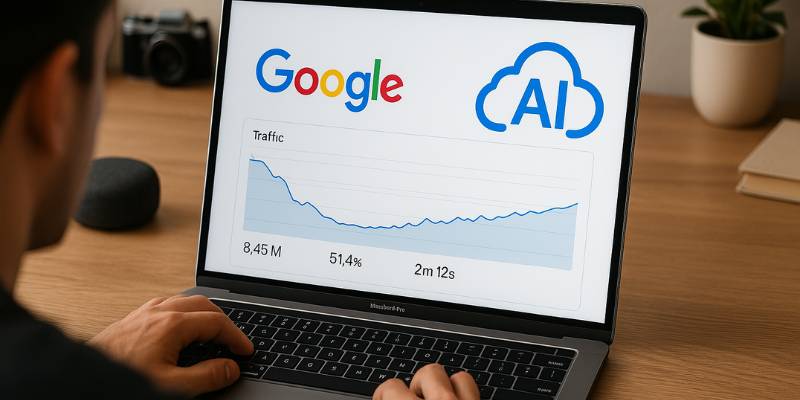Search isn’t what it used to be. A few quiet updates from Google have kicked off one of the biggest shake-ups the web’s ever seen.
With its new AI Overviews and conversational query model, Google is turning traditional search into something that feels less like browsing and more like talking to a well-informed assistant.
The change, outlined in a deep dive into AI-driven search evolution, is already rewriting the rules of SEO, marketing, and even journalism.
It’s not just the look of results that’s changing — it’s the logic behind them. The new AI-powered system breaks down complex queries into multiple layers, scouring data sources to craft cohesive answers instead of simply linking out.
When users ask, say, “What’s the best eco-friendly paint for kitchens?” Google’s AI now synthesizes expert recommendations, price trends, and user sentiment — all within the results page.
Marketers used to optimizing for short keywords now have to grapple with “intent webs,” the interconnected logic that Google’s AI thrives on.
As one analysis of this shift points out, these AI layers are blurring the line between discovery and decision-making, leaving little room for the traditional click-through game that SEO once depended on.
That’s why digital strategists are calling it “the zero-click era.” Data already suggests that 94% of AI-powered searches end without users ever visiting another website — the answer lives entirely in the overview box.
Some marketing veterans have warned that this could decimate organic traffic, as described in a study examining how AI summaries are swallowing clicks before they even reach publishers in a recent breakdown of shifting search behaviors.
There’s also a human side to all this — and it’s not all optimism. Many journalists and content creators are already seeing the effects: fewer site visits, lower ad impressions, and less visibility overall.
In Australia, media outlets have reported steep drops in external traffic since AI Overviews rolled out regionally, sparking a broader conversation about the future of information access and who controls it.
That concern was echoed in coverage of Google’s AI expansion in global markets, where some publishers described it as “being erased from their own audience,” a story explored further in an ABC News report on how AI Overviews are transforming search traffic.
And yet, while Google faces mounting criticism, it’s also doubling down on its AI ambitions.
The company recently struck major deals to power global events with its cloud-based AI infrastructure, including a collaboration to handle analytics for the Los Angeles 2028 Olympic Games, detailed in a report on Google’s latest expansion of AI-powered services.
Behind the scenes, the same AI systems that deliver search overviews are driving innovations across cloud computing, advertising, and media, raising new questions about how much influence one company should have over both what we see and how we think online.
But it’s not all tech polish and corporate promises. Regulators in the UK have started investigating Google’s search ad dominance, urging the company to share more data with competitors and reduce self-preferencing in its ad stack — a subtle but powerful reminder that the gatekeepers of the internet are not immune to oversight.
That effort was described in a recent briefing on how competition authorities are targeting Google’s strategic role in search advertising, a move that could ripple into how AI search results themselves are structured.
What strikes me most about all this is the irony — for decades, SEO experts fought to decode the machine’s logic; now, the machine’s learning to think for itself.
We’re no longer trying to rank higher in Google. We’re trying to be trusted by its AI. Maybe that’s the new frontier — not gaming the system, but earning its confidence.
It’s unsettling and fascinating all at once, like watching the ground move beneath your feet and realizing the world’s getting rebuilt while you’re still standing on it.

